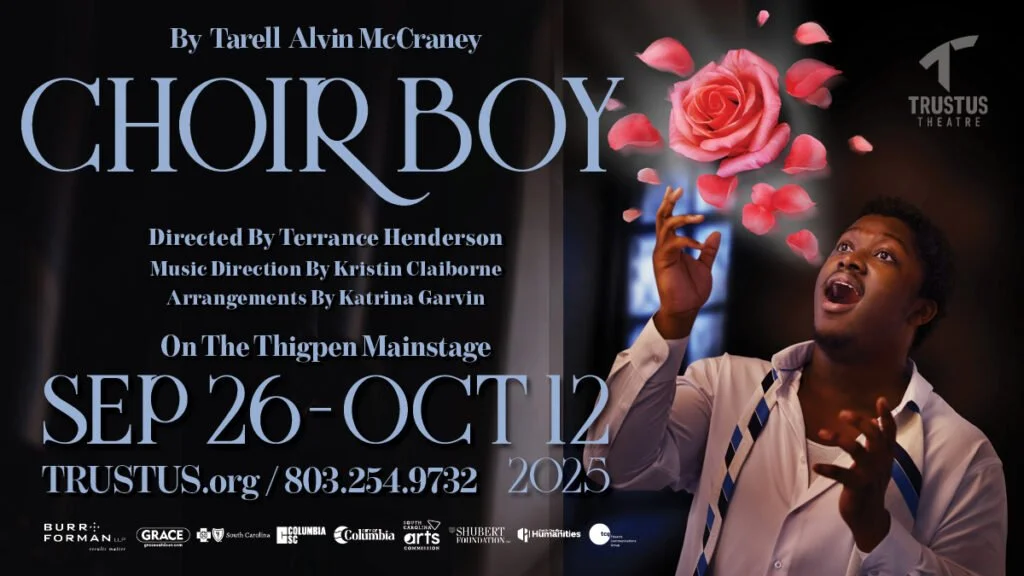I’ve been churched—and I loved it. That’s the only way to describe Trustus Theatre’s electrifying production of Choir Boy, a play with music that bursts with life, laughter, conflict, and harmony. Directed and choreographed by Terrance Henderson, this production is a moving, joyful, and thought-provoking journey that should not be missed.
The play begins at the Charles R. Drew Prep School for Boys, an elite all-Black academy. It’s graduation day, and Pharus (John Ballard), a flamboyant and gifted junior, is chosen to sing a solo. When his performance is disrupted by Bobby Marrow (Jlynn Montgomery) and his sidekick Junior (Jamal Davis), who sling racial and homophobic slurs, Pharus falters. But in a dazzling recovery—equal parts comedic and defiant—he riffs his way through the interruption, instantly capturing the audience’s admiration. Ballard’s performance sets the tone for the evening: witty, vulnerable, and utterly captivating.
As the new school year begins, Pharus is named leader of the choir, sparking conflict with Bobby. Their battle of wills plays out against the larger expectations of Headmaster Marrow (William Paul Brown), who struggles to discipline his nephew Bobby while remaining fair to Pharus. Brown brings both authority and humanity to the role, portraying a man who is equal parts stern administrator and conflicted guardian.
The student ensemble is a highlight of the show. Montgomery gives Bobby a fiery intensity, making him more than just a bully—his commanding vocals and emotional depth reveal the layers beneath the bravado. Davis, as Junior, captures the hesitancy of a follower caught between loyalty and conscience. Jonathan Adriel’s AJ, Pharus’s loyal roommate, is portrayed with warmth and sensitivity; his friendship with Pharus is one of the production’s most touching threads. Daniel Mason shines as David, the deeply religious student torn between faith and desire. Mason’s vocals are rich and heartfelt, and his emotional honesty gives his performance a memorable weight.
Adding depth and humor to the mix is Larry Hembree as Mr. Pendleton, a guest professor who challenges the boys to think critically and independently. Hembree’s performance is a welcome blend of charm and gravitas, bringing levity to tense moments while grounding the story in its themes of growth and change.
The music of Choir Boy is its heartbeat, and under the musical direction of Kristin Claiborne with arrangements by Katrina Garvin, it soars. The cast delivers rousing renditions of spirituals like Eyes on the Prize and Sometimes I Feel Like a Motherless Child, alongside modern selections like New Edition’s Can You Stand the Rain. The harmonies are powerful and deeply moving—sometimes jubilant, sometimes haunting, always resonant. The music is not just accompaniment but storytelling in its own right, carrying the history, faith, and struggles of the characters.
Henderson’s direction and choreography tie it all together with artistry and precision. His infusion of prayer dance and stylized movement elevates the production, turning moments of conflict and celebration into something almost transcendent. The staging is fluid and alive, reinforcing the themes of identity, resilience, and community.
At nearly three hours, the production is a full evening of theatre, yet it never feels long. The pacing is sharp, the performances captivating, and the music unforgettable. By the curtain call, the audience is left exhilarated, reflective, and deeply moved.
Trustus Theatre has delivered a production that is both entertaining and meaningful. Choir Boy doesn’t just tell a story—it invites its audience to feel, to question, and to celebrate. In the end, you don’t just watch the show—you experience it. And when it’s over, you too will feel that you’ve been churched.
Choir Boy runs through October 12 at Trustus Theatre. Tickets are available at trustus.org or by calling 803-254-9732. Don’t miss the chance to be part of this extraordinary experience.






